Victoria Thompson: Murder on Morningside Heights
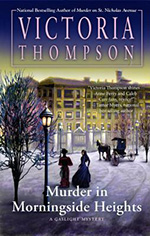 It’s been awhile since I checked in with Thompson’s midwife character, Sarah, and I was a bit surprised to find her married, wealthy, and an unwilling lady of leisure. Like her sister character Molly Murphy, the leisured life is not going to suit her for too long, and she’s in on Frank Malloy’s first case as a private detective. This series is set in turn of the century New York. Malloy had been a policeman; at the time, the police were far more likely to investigate a case involving a reward. Malloy, knowing the ins and outs of the police department, is almost a step ahead as he works on his own.
It’s been awhile since I checked in with Thompson’s midwife character, Sarah, and I was a bit surprised to find her married, wealthy, and an unwilling lady of leisure. Like her sister character Molly Murphy, the leisured life is not going to suit her for too long, and she’s in on Frank Malloy’s first case as a private detective. This series is set in turn of the century New York. Malloy had been a policeman; at the time, the police were far more likely to investigate a case involving a reward. Malloy, knowing the ins and outs of the police department, is almost a step ahead as he works on his own.
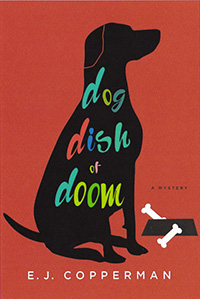 E.J. Copperman – I’ve said this before, and I’ll say it again – is one of the best cozy writers working at the moment. This is the introduction of yet another series from this talented writer, this one about an “Agent to the Paws,” i.e. a showbiz agent who works with animals. Kay Powell lives in New Jersey, sometimes with her aging vaudevillian parents (who are, happily for this reader, en residence in this novel). As the book opens she’s trying to snare a gig for agreeable shaggy dog Bruno to play Sandy in an Annie revival on Broadway. She thinks the audition might be a disaster, thanks to loud remarks made by Bruno’s owner about the ineptness of the director casting the part.
E.J. Copperman – I’ve said this before, and I’ll say it again – is one of the best cozy writers working at the moment. This is the introduction of yet another series from this talented writer, this one about an “Agent to the Paws,” i.e. a showbiz agent who works with animals. Kay Powell lives in New Jersey, sometimes with her aging vaudevillian parents (who are, happily for this reader, en residence in this novel). As the book opens she’s trying to snare a gig for agreeable shaggy dog Bruno to play Sandy in an Annie revival on Broadway. She thinks the audition might be a disaster, thanks to loud remarks made by Bruno’s owner about the ineptness of the director casting the part.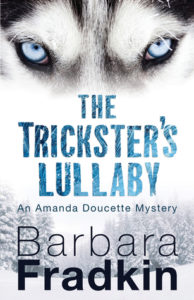 This is a terrifically exciting novel by the always interesting Barbara Fradkin. The second in a series featuring traumatized international aid worker Amanda Doucette, the book opens as Amanda is planning a trek into the Canadian wilderness in the dead of winter, taking along “marginalized” students struggling to acclimate to Canadian culture after fleeing violent situations in their homelands. While the requirement is not that the students be foreign, merely struggling, most of them are from other countries with many Muslims being represented. Amanda’s idea is to build bridges one at a time while sharing a common experience.
This is a terrifically exciting novel by the always interesting Barbara Fradkin. The second in a series featuring traumatized international aid worker Amanda Doucette, the book opens as Amanda is planning a trek into the Canadian wilderness in the dead of winter, taking along “marginalized” students struggling to acclimate to Canadian culture after fleeing violent situations in their homelands. While the requirement is not that the students be foreign, merely struggling, most of them are from other countries with many Muslims being represented. Amanda’s idea is to build bridges one at a time while sharing a common experience.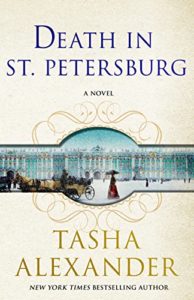 I love Tasha Alexander – her books are all so delicious in every way, but this one may be my absolute favorite. Lady Emily accompanies her husband (who is on an espionage mission) to Russia, where she is just supposed to be enjoying herself and having a little vacation. Ha! The book opens with a dead ballerina in the snow. Lady Emily is present at the discovery of the body, and of course, she’s drawn into the investigation.
I love Tasha Alexander – her books are all so delicious in every way, but this one may be my absolute favorite. Lady Emily accompanies her husband (who is on an espionage mission) to Russia, where she is just supposed to be enjoying herself and having a little vacation. Ha! The book opens with a dead ballerina in the snow. Lady Emily is present at the discovery of the body, and of course, she’s drawn into the investigation.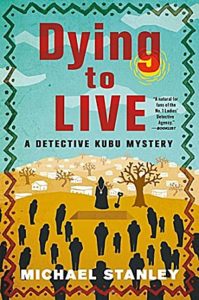 This wonderful series only continues to get better. Weirdly, I also think it may be one of the more realistic police procedural series around, as the careful, detail oriented work carried out by Detective Kubu and his fellow officers seems like what painstaking police work may actually resemble. Detective Kubu is also immensely appealing – his happy family life, his love of food and wine, and his leaps of deduction that come while napping (very Nero Wolfe of him) make him one of my favorite characters in mystery fiction at the moment.
This wonderful series only continues to get better. Weirdly, I also think it may be one of the more realistic police procedural series around, as the careful, detail oriented work carried out by Detective Kubu and his fellow officers seems like what painstaking police work may actually resemble. Detective Kubu is also immensely appealing – his happy family life, his love of food and wine, and his leaps of deduction that come while napping (very Nero Wolfe of him) make him one of my favorite characters in mystery fiction at the moment.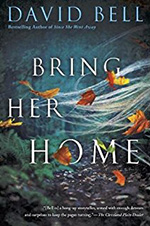 In suspense fiction the setup is crucial, and, as one of its finest practitioners, David Bell knows how to start his tale with a bang big enough to energize the compelling universe that follows. His latest superior work, Bring Her Home, begins with a man rushing into a hospital trying to find his daughter, frantic but at the same time desperately trying to keep himself together in midst of the bureaucratic chaos. While many other suspense writers feature impossibly virtuous supermen or bland mannequins whose features are obscured by a blinding fog of plot, Bell brings a regular but not quotidian protagonist to his tale, a guy thrust into the middle of life and death events way over his head, but who is determined to find justice for those closest to him in the best way he can.
In suspense fiction the setup is crucial, and, as one of its finest practitioners, David Bell knows how to start his tale with a bang big enough to energize the compelling universe that follows. His latest superior work, Bring Her Home, begins with a man rushing into a hospital trying to find his daughter, frantic but at the same time desperately trying to keep himself together in midst of the bureaucratic chaos. While many other suspense writers feature impossibly virtuous supermen or bland mannequins whose features are obscured by a blinding fog of plot, Bell brings a regular but not quotidian protagonist to his tale, a guy thrust into the middle of life and death events way over his head, but who is determined to find justice for those closest to him in the best way he can.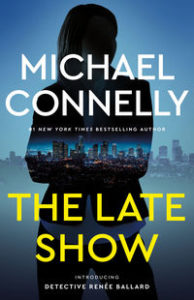 Michael Connelly has seamlessly launched a new character and series, introducing Detective Renee Ballard. Ballard works “The Late Show,” or the overnight shift, and she’s in a bit of purgatory as she’s accused her former boss of sexual harassment. When the charges went nowhere (her old partner didn’t back her up), she was booted to the Late Show, where she catches cases but isn’t able to follow them through to a conclusion. She instead turns them over to the pertinent department – homicide, robbery, etc. She’s feeling the lack of follow-through – she’s not as engaged in her job and her partner, who works the late shift to get home and care for a wife with cancer, doesn’t have the same focus she does.
Michael Connelly has seamlessly launched a new character and series, introducing Detective Renee Ballard. Ballard works “The Late Show,” or the overnight shift, and she’s in a bit of purgatory as she’s accused her former boss of sexual harassment. When the charges went nowhere (her old partner didn’t back her up), she was booted to the Late Show, where she catches cases but isn’t able to follow them through to a conclusion. She instead turns them over to the pertinent department – homicide, robbery, etc. She’s feeling the lack of follow-through – she’s not as engaged in her job and her partner, who works the late shift to get home and care for a wife with cancer, doesn’t have the same focus she does.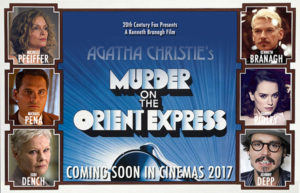 Every couple years the “public” rediscovers Agatha. As there’s a new film of Murder on the Orient Express due in the fall, non-crime readers have been looking for that particular book. In general, however, Christie remains our bestselling author as her appeal is timeless. I was thinking about the innovations she brought to crime fiction and thought about her plots, for which she is justly famous.
Every couple years the “public” rediscovers Agatha. As there’s a new film of Murder on the Orient Express due in the fall, non-crime readers have been looking for that particular book. In general, however, Christie remains our bestselling author as her appeal is timeless. I was thinking about the innovations she brought to crime fiction and thought about her plots, for which she is justly famous.